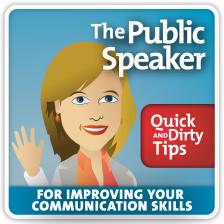Are You Straining Your Voice with Vocal Fry?
You’ve probably never heard of vocal fry, but chances are you know what it sounds like. The Public Speaker explains why vocal fry can harm your voice and hurt your job prospects.
Lisa B. Marshall
Listen
Are You Straining Your Voice with Vocal Fry?
Vocal fry.
You might not have heard the term, but you’ve certainly heard what it sounds like. Vocal fry is a speech affectation that sounds like the person’s vocal cords are strained or laryngitis is setting in..

Why should we care about vocal fry? Isn’t it just a harmless fad, much like the 1980s Valley Girl “uptalk”? Not quite. There are a few reasons we should work to keep vocal fry out of our speech:
Reason #1: Vocal Fry Can Hurt Your Voice
Vocal fry isn’t a major health concern. But if used for an extended period of time, it can cause your throat to feel tired and sore. That’s because you’re sending small puffs of air through your vocal cords that causes them to slap together instead of rubbing smoothly. If you do it long enough, fatigue will set in.
Vocal coach Judy Rodman warns that vocal fry can damage your vocal chords. “Vocal fry in the speaking voice, or what I like to call ‘falling on gravel,’ is one of the sneakiest and most pernicious causes of vocal fatigue. If you don’t talk much, maybe this doesn’t turn into that much of a problem, but most people find themselves talking for long stretches.”
Reason #2: Vocal Fry Can Hurt Your Job Prospects
In May of 2014, the online journal PLOSone published a study titled “Vocal Fry May Undermine the Success of Young Women in the Labor Market.” To briefly summarize, the study took a small group of young men and women and had them read a line twice; once with vocal fry and once without.
The recordings were then played for a large sample of listeners of all ages. The listeners were asked to choose which one was the most hirable, the most trustworthy. The vast majority of listeners chose the recordings without vocal fry. Overall, the sample group reacted negatively to the vocal fry recordings.
Reason #3: Vocal Fry Hurts Women More than Men

How to Break the Vocal Fry Habit
If you want to improve your credibility and protect your vocal cords, I recommend keeping vocal fry out of your speech habits. If you’re not sure if you’re doing it, try recording your voice and listening for that gravelly, creaking sound at the end of your sentences.
Vocal coach Judy Rodman says there are a few exercises you can do to get rid of vocal fry. For example, she recommends using tongue twisters for practice. Try these:
- red leather yellow leather
- eleven benevolent elephants
- good blood bad blood
- you know you need unique New York
While saying the tongue twisters, if you end your phrase on a gravelly note, you have to start over.
Ms. Rodman also recommends focusing on speaking with active eyes and body language. When you engage your face and body, you’re more likely to speak with balanced breath and an open throat. This helps you stick with normal inflection instead of ending on a creaky note.
Vocal fry can be harmful to your vocal cords and to your professional image. Unless you’re not Kim Kardashian, you should let this trend pass you by.

If you want even more success in your life, I invite you to read my latest book, Smart Talk and listen to my other podcast, Smart Talk: Inspiring Conversations with Exceptional People.

